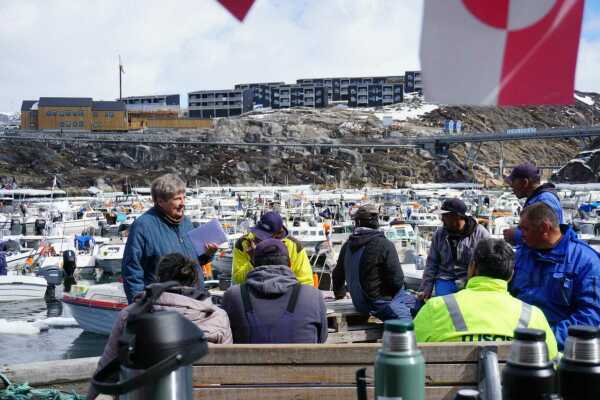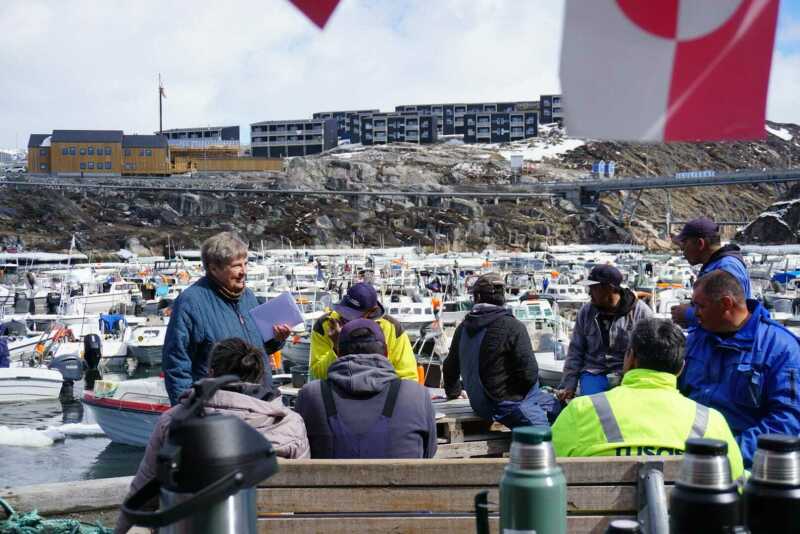 Else Højvang, one of the chaplains, pictured chatting to seafarers at the harbour in Ilulissat, Greenland | Sømandsmissionen
Else Højvang, one of the chaplains, pictured chatting to seafarers at the harbour in Ilulissat, Greenland | Sømandsmissionen
Loneliness is the greatest challenge for the seafaring men who work hard on ships in bitter sub-zero temperatures within the Arctic Circle, says the head of Somandsmissionen (Seafarers Mission) based in Denmark and Greenland, the only known evangelistic ministry supporting people working at sea.
Christian Daily Interview had an opportunity to interview Nicolaj Wibe, general secretary of the 125-year-old mission alongside his colleague and business manager Magnus Elleby, who runs hotels that provide an independent income for the ministry, about the unique challenges they face as they serve these often forgotten blue collar workers.
Wibe, who has led the mission for the past 10 years, explained that the ministry provided a vital lifeline to the “very lonely” seafarers, whose “main pain” is loneliness. Many of them are Filipinos with a Christian background.
“If we do not visit the crews on these vessels, no one would do it,” Wibe commented. “It is a seamen’s mission and we are the only ones to take care of the seafarers.”
The mission’s eight chaplains in Denmark and four in Greenland support crews on large container ships, oil vessels, navy ships, offshore and wind power sites, simply said “everything on the sea.” They work not only with seafarers but also fishermen, hunters, even tourists in the local land areas, with help from volunteers. Their main focus, however, is on the seafarers.
In order to minister to crews, the chaplains request permission from sea vessel authorities to visit the men on ships. They always receive a positive response, Wibe explained. The authorities may even highlight any particular pastoral needs.
As example, he says that ten ships could be docked in a port, so the chaplains organize visiting them in turn. The convivial meetings are often short in time, perhaps 15 minutes maximum, because of commercial pressures on the men-at-sea to keep up productivity. Yet the chaplains find a warm welcome by the crews, often with coffee, cake and frank conversation. Wibe called the pastoral effect “amazing,” despite the time limitations for the short meetings.
“They are so important for our daily lives but we [the public] never see them,” Wibe pointed out. “In the supermarkets we have what we need but who brings these goods to us? It is the seafarers!
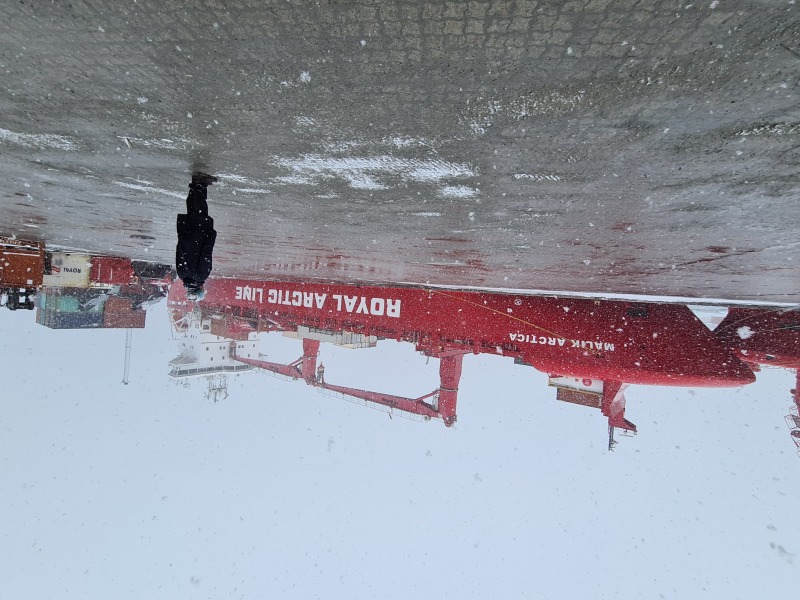 Although seafarers often work in harsh conditions, few people think of their important role for society. | Sømandsmissionen
Although seafarers often work in harsh conditions, few people think of their important role for society. | Sømandsmissionen
“It is so hard for these men and it’s a calling from God for us to show them good deeds, talk with them, to get food for them and give fellowship, to give them Christian welfare. That’s the purpose we have. Nobody except this seamen’s mission takes care of these people.”
The purpose of the mission is to “make a space where it’s good to be there for them,” Wibe explained. He outlined how the crews suffered a sense of alienation, far from their families. This was the main point of contention.
“One of the biggest challenges for seafarers today is the feeling of being very, very alone. So a visit to a vessel is always welcomed, for us just to talk and ask, ‘how are you? How is it to be on this vessel? What about your family?’”
Wibe further explained that Danes and Greenlanders culturally keep matters of faith private whereas the seafarers working in solitude in the nearby waters are very open to talking about faith and receiving prayer.
“They are often coming from a Christian background, especially the Filipinos, so it is normal for us to ask, ‘Do you need a free Bible in your own language?’ It is natural for us. And then we can ask, ‘Can we pray for you, your wife, your kids at home?’”
Despite the crews working in close proximity to each other – a typical vessel can host eight to twelve workers – the seafarers project a tough exterior while hiding their private, inner struggles. This internal turmoil can then express itself in unhelpful ways, such as excessive drinking or pornography.
“They are men, so it’s not natural to talk about feelings, such as missing their wives, those things,” said Wibe. “So when we visit as guests, they are so open and appreciate a visit from us.”
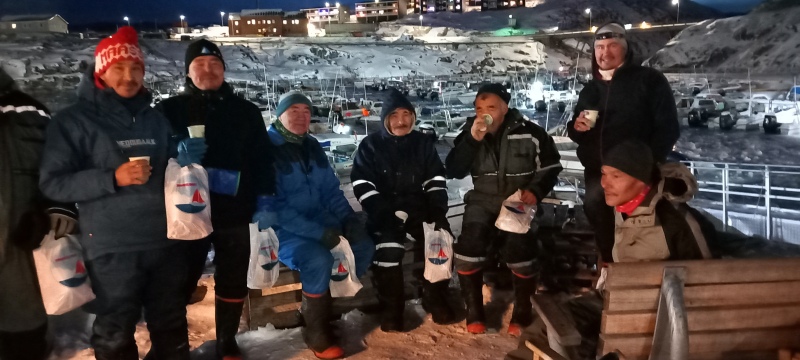 Offering coffee to a crew and engaging in conversations is part of the seafarers’ mission daily activities. | Sømandsmissionen
Offering coffee to a crew and engaging in conversations is part of the seafarers’ mission daily activities. | Sømandsmissionen
The chaplains offer practical help, showing gospel values by taking any unwell seafarers to hospital for a check-up if needed, or visiting a supermarket for goods, or just accompanying them for a visit to a nearby town center, when a vessel is docked in a port, for an hour or two for light relief from work duties.
The seafarers’ mission also uses a former Norwegian Navy ship called “Bethel,” which sails during the summer and is open as a cafe with pastoral space for visitors. It is also used as an outreach for maritime students.
“We are doing it because we are Christians,” Wibe says, “and we want to bring good news on board the vessels and very often that good news involves good deeds, helping the seafarers and listening to them.”
Cruise ships coming into Denmark and Greenland pose a particular challenge. Wibe explained that for the crews on board “it’s very, very often awful. It’s extremely hard.” For the guests, the ships represented luxury with a large service offering, plenty of food and wine “when you need it.” But the crews work extremely hard to ensure the hospitality is of a high standard.
“We do what we can to be connected to them,” said Wibe. “There are maybe between one to one-and-a-half thousand members of crews on these cruises. There are a lot of females and one of the biggest challenges is that they work so hard from early morning. They miss their families so much and sometimes they use alcohol or drugs on board just to survive.
“Suicides are a big problem for these crews on board these cruise ships because it is so hard.”
The seafarers’ mission tries to provide opportunities for the cruise ship crews to rest, recuperate and get in touch with loved ones. In the Danish port of Aarhus, for example, the chaplains invite crews to the Aarhus Seamen’s Club for leisure time and pastoral care.
Wibe has female chaplains working with the female crew members on the cruise ships. “We do our best for them but it is very hard for them,” he emphasized again.
At the moment, the main challenge for Wibe is finding chaplains for the northern part of Greenland. In his own words, “it’s very hard to work in a cold and dark place” with short summer seasons. “But we have what we need because God gives us what we need.”

The seafarers’ mission is funded by SØMA hotels in Greenland, in the capital city of Nuuk, as well as in Sisimiut city and the towns of Aasiaat and Ilulissat. The ministry is also connected to a hotel business in mainland Denmark, in Aalborg, Frederikshavn and Copenhagen.
This accommodation is offered akin to any other hotels on a commercial basis, but subtly infuses the gospel message with Bible quotes written on the walls and copies of Bibles left in bedrooms.
Magnus Elleby, who serves as the head of business for the hotels, said the income enabled the seafarers’ mission to be completely independent. “That’s something I really like – we earn our own money without being dependent on someone else.”
The hotels are also utilized as bases for chaplains and volunteers. Daily work typically starts with a 10am devotional time, to which guests are invited, often including seafarers when they are on land. It includes a small devotion and reflection, Bible reading and worship. The chaplain will also share about recent ministry activities, and then all attendees will tuck into breakfast and enjoy fellowship together.
The work with seafarers is part of a wider remit for the ministry showing the gospel to the port communities, according to Elleby. The chaplains also visit prisons, children’s camps and orphanages, and elderly care homes. In the winter, when Greenland is blanketed with polar temperatures, they approach fishermen tending to their nets by the sea shore and invite them into the hotels for coffee and informal conversation.
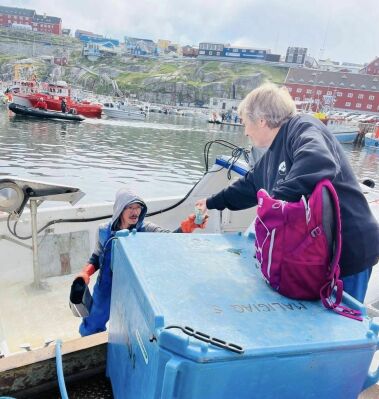 Handing coffee to a local fisherman. | Sømandsmissionen
Handing coffee to a local fisherman. | Sømandsmissionen
Large shrimp trawlers often seen plowing the rolling swell of the icy seas provide a vital income for nearby communities in Greenland. Up to 21 people man the crews on board these vessels, working in tough environments.
Elleby narrated a true story about one of the trawlers that was out on sea for five to six weeks, without catching any shrimp. “The mood was bad on board,” he remembered, “because they depend economically on the shrimp.”
The crew got in touch with one of the chaplains from the Seafarer’s Mission and asked her, somewhat sardonically, to pray for them about the dire situation. “Of course!” came the chaplain’s reply and she obliged in lifting the crew to the Lord in prayer.
“Two weeks after her prayer,” said Elleby with a smile, “the crew returned to port with a massive catch of shrimp – it was a record catch!
“It opened the eyes of the crew and they now ask the chaplain to pray for every aspect of their lives. If someone is unwell on board, they ask, ‘Please pray!’ and they can see it has an effect.”
Even the ship captain acknowledged the powerful effect of prayer and Elleby said he requested support when a crew member died, and the hardy fishermen were bereft.
“I trust you can pray for us,” the captain reportedly said to the chaplain, who replied, “I will always pray for you.”
For Elleby, this miracle catch of shrimp marked a powerful reminder as to why the seafarers’ mission existed in the first place. “We want to be present there every day, to pray for the small things and the big things, and when the big things come up, we are always there for them.”
Another story Elleby recalled tells how a mother turned up at one of the hotels with her two tired children. She had been beaten by her husband and had no place to stay. Although the hotels are a professional business, the calling of Christ to serve meant the hotel provided a bed for her family for a night and she readily received prayer.
“As soon as we prayed for this woman, she was completely changed and she found hope. She managed to get herself together. We just gave her a place to stay and prayed for her, and she felt completely overwhelmed. She is doing well now and the last I heard, had relocated to the south of Greenland.”
Foreign workers, such as from Thailand and the Philippines, come to work on the ships in Greenland because the local workforce is not large enough in numbers. Elleby foresees more workers coming in the future with a knock-on upsurge in demand for the seafarers’ mission to offer support.
Another related mission field are Navy warships. The seafarers’ charity usually invites crews to the hotels for a sumptuous festive feast every Christmas where they give gifts to the crews.
Following discussions with the navy authorities, however, the mission became aware that the navy crews themselves wanted to serve for the good of the local community, to have a sense of moral purpose. Therefore, Elleby and his colleagues are planning to invite the navy crews to the hotel kitchens to cook festive fare for needy and homeless people in Greenland’s ports.
“It gives them an opportunity to be part of something bigger than their own work,” said Elleby.
In closing, Wibe asked for prayer that when the chaplains visit the vessels, often giving out Bibles, listening to the men and women, praying for them, that they would “plant some hope in Jesus Christ.”
“My prayer request is that when we go on board a vessel, the Spirit of Jesus Christ must be there.”
